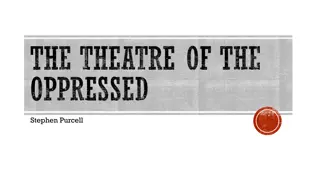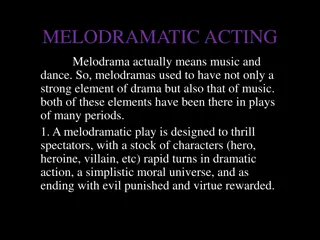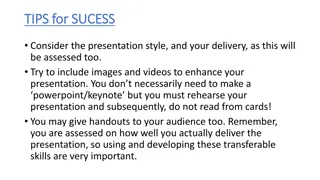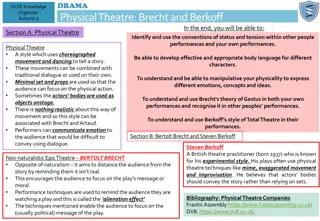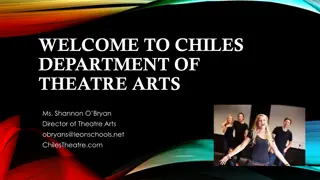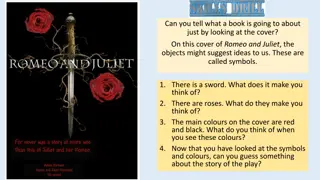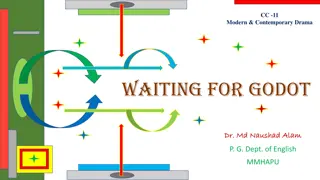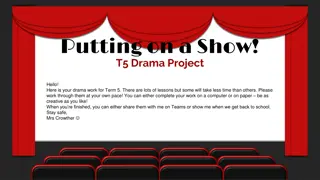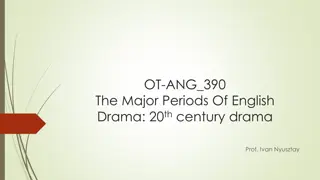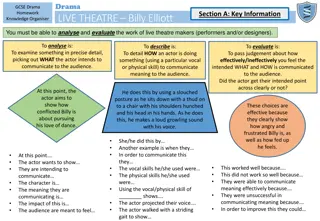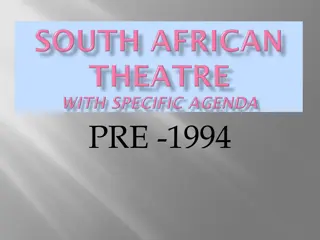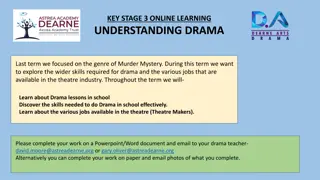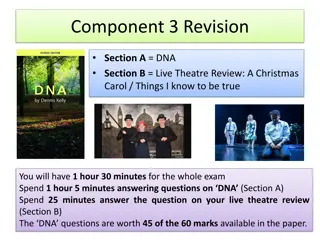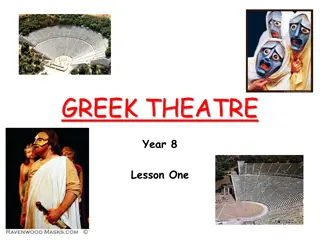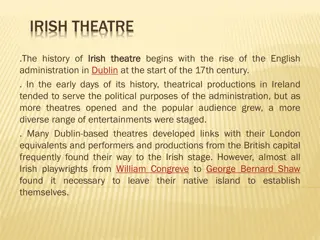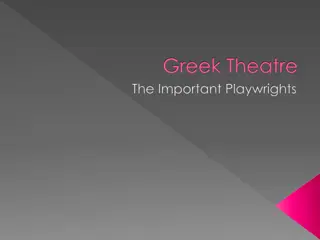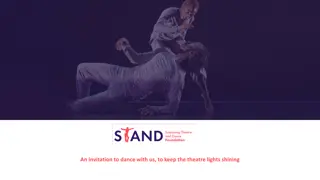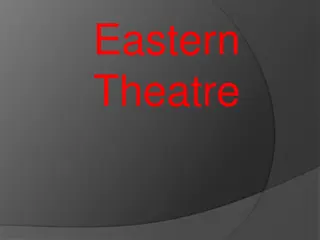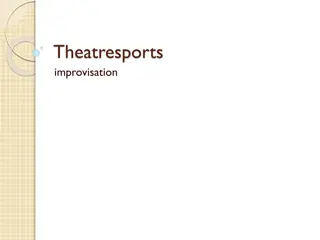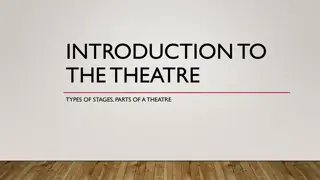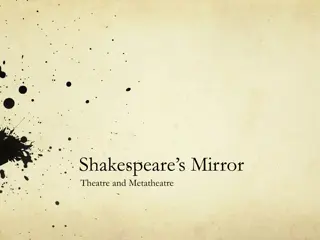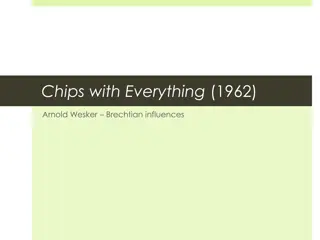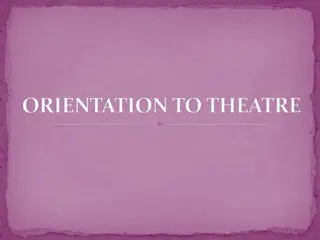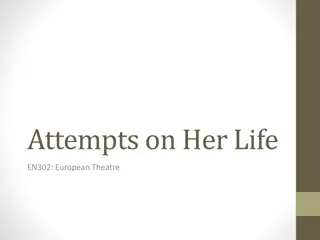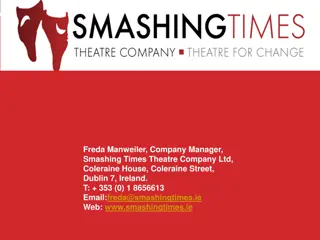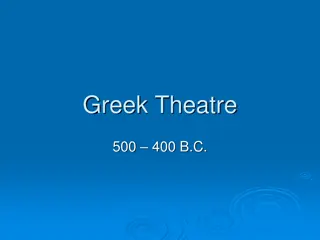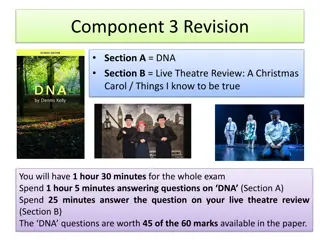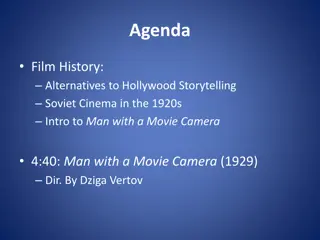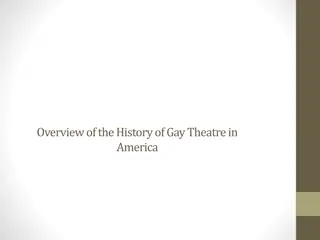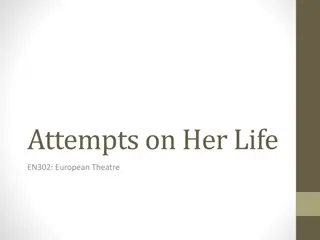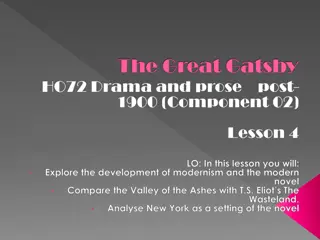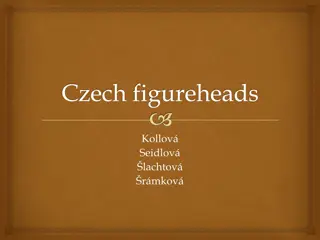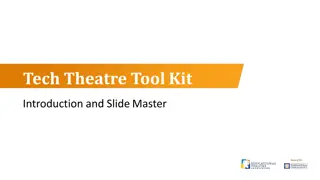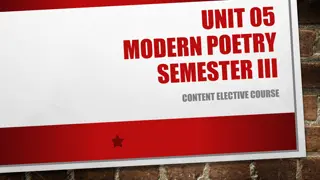Evolution of Theatre: From Dithyrambic Song to Political Theatre
The evolution of theatre from communal dithyrambic song to structured performances with Aristotelian influence, along with the revolutionary practices of Augusto Boal in creating a theatre for the people. Explore the origins, philosophies, and techniques that have shaped the art of theatre over cent
1 views • 36 slides
Ernest Hemingway: Iconic Writer of the Lost Generation
Ernest Miller Hemingway, born in Oak Park, Illinois, was a prominent writer of the Lost Generation. His experiences in World War I influenced his writing style, marked by simplicity and objectivity. Moving to Paris, he mingled with Modernist artists and revolutionized American fiction. The Lost Gene
3 views • 24 slides
Understanding Melodramatic Acting in Theatre
Melodramatic acting in theatre combines elements of drama, music, and spectacle to create thrilling performances for audiences. These plays feature stock characters, rapid dramatic action, and a simplistic moral universe where good triumphs over evil. Actors in melodramas must master melodramatic sp
0 views • 7 slides
Mastering Presentation Skills for Success in World Theatre Tradition Research
Enhance your presentation style and delivery to excel in your World Theatre Tradition research by utilizing images, videos, and interactive elements. Avoid reading directly from cards, and ensure your timing is precise within the allocated 15 minutes. Cover key criteria like contextual background, c
1 views • 12 slides
Understanding Physical Theatre: Brecht and Berkoff - GCSE Knowledge Organizer
Physical Theatre involves choreographed movements and minimal set usage to convey stories and emotions effectively. Brecht and Berkoff are notable figures in this style, using techniques like status, tension, and body language. Brecht's Epic Theatre aims to distance the audience from the story, focu
0 views • 4 slides
Welcome to Chiles Department of Theatre Arts
Ms. Shannon O'Bryan is the Director of Theatre Arts at Chiles Department of Theatre Arts, offering a variety of classes including Beginning Classes in Theatre, Theatre 1, Technical Theatre Design & Production, Costume & Makeup Design. Students learn oral and written communication, group problem solv
0 views • 11 slides
Symbols and Facts: Uncovering Shakespeare and Elizabethan Theatre
The analysis begins by exploring the symbols present on the cover of "Romeo and Juliet" such as the sword and roses. It then delves into distinguishing facts from opinions regarding Shakespeare's life, touching on key events like his baptism, marriage, and career. Additionally, it provides insights
0 views • 26 slides
Understanding Samuel Beckett's Waiting for Godot: A Modernist Masterpiece
Samuel Beckett, a prominent modernist writer, crafted the groundbreaking play "Waiting for Godot" as a tragicomedy in a theater of the absurd. Set in a vague time and place, the play reflects the post-World War II disillusionment and existential themes. Beckett's experimental approach challenges tra
1 views • 16 slides
Design Your Dream Theatre Project for Term 5 Drama
Embark on an exciting drama project for Term 5 by researching different types of theatres, selecting an auditorium, designing the interior and exterior of your theatre, and creating a mood board for decorating and furnishing. Get creative and pick a name that aligns with the theme of your envisioned
0 views • 49 slides
Evolution of English Drama in the 20th Century: Shaw, Ibsen, and Modernist Theatre
The 20th century English drama witnessed significant shifts, from the realism and naturalism of George Bernard Shaw and Ibsen to the modernist theatre of Samuel Beckett, Tom Stoppard, and Harold Pinter. Themes of social change, rejection of traditional ideals, and a focus on human experiences domina
0 views • 39 slides
Analysis of Live Theatre in "Billy Elliot" for GCSE Drama Homework
In this drama homework knowledge organiser for GCSE Drama, students are guided on how to analyze and evaluate the work of live theatre makers, focusing on the key information related to the play "Billy Elliot." The document provides explanations on analyzing, describing, and evaluating the performan
0 views • 7 slides
Evolution of Theatre in South Africa: A Political and Cultural Journey
The historical development of theatre in South Africa reflects the country's tumultuous political landscape and societal divisions. From the imposition of apartheid laws in the 1940s to the resistance and creativity of marginalized artists in the face of oppression, the evolution of theatre demonstr
0 views • 12 slides
Exploring Drama Skills and Theatre Jobs in Key Stage 3 Online Learning
Dive into the realm of drama in Key Stage 3 online learning focusing on developing a broader understanding of drama skills beyond Murder Mystery genre exploration. Uncover the necessary skills for effective drama engagement in school, explore various jobs in the theatre industry, and reflect on the
0 views • 8 slides
Exam Preparation Strategies for DNA and Live Theatre Review
Prepare effectively for your exam by focusing on DNA concepts and live theatre review strategies, including rehearsal techniques and design elements. Learn how to approach DNA questions and craft your live theatre review effectively within the allocated time frame.
0 views • 15 slides
Exploring Greek Theatre: Unison and Chorus Activity
Dive into the world of Greek Theatre with a focus on how the chorus is used, engaging in activities to understand unison and synchronization. Discover fascinating facts about Greek Theatre and its unique characteristics.
1 views • 30 slides
History and Evolution of Irish Theatre
Irish theatre has a rich history intertwined with politics and cultural developments. From serving political purposes in the 17th century to nurturing indigenous writers and performers in the 20th century, Irish theatre has seen significant evolution. Dublin has been a key hub for theatrical product
0 views • 24 slides
Insights into Greek Theatre's Renowned Playwrights and Dramatic Elements
Greek theatre history and key figures, including important playwrights like Aeschylus, Sophocles, and Euripides. Aristotle's theories on drama elements, Thespis' innovations, and Aristotle's Unities of Drama are explored. The impact of these elements and playwrights on ancient Greek theatre is highl
7 views • 9 slides
Exploring Arts, Culture, and Heritage in Theatre and Dance: a Look at the 1996 White Paper
Delve into the background and significance of the 1996 White Paper on Arts, Culture, and Heritage as it pertains to Theatre and Dance. Discover the historical context, the process that led to its creation, and the specific content related to Theatre and Dance. Gain insights into the relevance and im
9 views • 16 slides
The Impact of COVID-19 on Theatre and Dance: STAND Foundation Launch
The arts industry, particularly dance and theatre, has been severely affected by the COVID-19 pandemic with cancelled performances, loss of income, and tragic losses of creatives. The STAND Foundation, launched in September 2020, aims to support and nurture South African dance and theatre during and
8 views • 13 slides
Exploring Plastic Theatre in Tennessee Williams' "A Streetcar Named Desire
Tennessee Williams introduced the concept of plastic theatre in the 1940s to create a new type of theatrical experience that combined non-literary elements with the literary text. This approach aimed to enhance the themes, characters, and language of the play by integrating elements such as setting,
0 views • 9 slides
The Vibrant World of Eastern Theatre
Explore the captivating world of Eastern theatre, encompassing the alluring sounds and colors that define its essence. From the ancient Noh performances deeply rooted in religion and tradition to the intricate art of Bunraku puppetry and the influential Kabuki plays, Eastern theatre offers a rich ta
0 views • 19 slides
The Evolution of Improvisational Theatre: From Theatresports to ComedySportz
Exploring the emergence and evolution of improvisational theatre from Theatresports created by Keith Johnstone in 1977 to the popular ComedySportz format in 1984. Discover the competitive nature, unique fouls, and global impact of these improv games, alongside modern adaptations like "Whose Line Is
0 views • 9 slides
An Overview of Theatre Stages and Terminology
Explore different types of theatre stages including Proscenium, Thrust, Arena, and Black Box stages along with stage directions and important terms used in theatre productions. Learn about the unique characteristics and layout of each stage type to understand how they influence performances.
0 views • 9 slides
Elizabethan Theatre Concerns and Metatheatre Reflections
The Elizabethan era was marked by concerns about the moral influence of theatres. This period saw the establishment of new buildings like The Theatre and The Curtain. Philip Stubbes criticized the theatregoers' behavior, highlighting perceived vices portrayed in plays. Similarly, Sir Philip Sidney d
0 views • 40 slides
Epic Theatre and Brechtian Influences in Modern Drama
Epic theatre, influenced by Bertolt Brecht, challenges traditional Aristotelian and Hegelian dramatic structures by emphasizing critical engagement and distancing strategies. It uses historical narratives and didactic elements to provoke social consciousness and active spectator participation, contr
0 views • 26 slides
The Waste Land by T.S. Eliot: A Modernist Masterpiece Examined
The Waste Land" by T.S. Eliot, published in 1922, is a seminal work of Modernist poetry that offers a bleak portrayal of modern life. This poem, heavily influenced by Ezra Pound's editing, delves into themes of societal decay, spiritual emptiness, and the search for renewal. Pound's collaboration wi
0 views • 26 slides
Theatre Essentials: Understanding Acting, Ensembleness, and More
Dive into the fundamental aspects of theatre, exploring topics such as the definition of theatre, the importance of ensemble work, acting principles, and the concept of ensembleness. Discover how theatre reflects real life, the parallels it shares with sports, and the rules actors abide by. Gain ins
0 views • 13 slides
Exploring European Theatre Traditions
European theatre traditions, as discussed through Lehmann's Postdramatic Theatre and Aristotle's dramatic elements, highlight the unique characteristics that differentiate them from non-European traditions. Concepts such as hamartia, anagnorisis, and mimesis are explored along with the rejection of
0 views • 30 slides
Smashing Times Theatre Company - Innovating Social Justice Through Artistic Excellence
Smashing Times Theatre Company, led by Freda Manweiler, is dedicated to merging art, culture, and politics to engage with contemporary society. With a rights-based approach, they offer professional theatre performances, workshops, and outreach activities. Drawing inspiration from renowned artistic s
0 views • 30 slides
Evolution of Greek Theatre: A Journey Through Time
Greek Theatre traces its roots back to 500-400 B.C. where it emerged from ritual dances and storytelling. The artform flourished during the Golden Age of Greece, producing timeless tragedies and architectural marvels. Festivals like the City Dionysia celebrated theatre as a national and religious ce
0 views • 12 slides
Exam Preparation Guide: DNA and Live Theatre Review Tips
In this guide, you will find essential information to prepare for your exam on DNA (Section A) and live theatre review (Section B). It includes details on the exam structure, insights on DNA questions, tips for live theatre review, and rehearsal techniques for actors. Discover key concepts to excel
0 views • 15 slides
Exploring Alternative Narratives in Early 20th Century Cinema
Delve into the world of Soviet Montage, German Expressionism, and French Impressionism as we examine the emergence of avant-garde filmmaking and modernist aesthetics in the 1920s. Discover the evolution of film history through experimental and documentary approaches, challenging traditional Hollywoo
0 views • 16 slides
Evolution of Gay Theatre in America
Gay theatre in America has overcome societal challenges, censorship, and stereotypes to emerge as a vibrant and essential part of the theatrical landscape. From the early struggles of gay playwrights like Oscar Wilde and Tennessee Williams to the groundbreaking works of the Caffe Cino and the impact
0 views • 6 slides
European Theatre: Exploring Dramatic Elements and Themes
European theatre has a rich history and tradition that distinguishes it from other global theatre practices. From Aristotle's dramatic elements to the conflicts faced by characters like Antigone and Creon, this form of theater delves into themes of recognition, imitation, and conflict. Hans-Thies Le
0 views • 35 slides
Exploring Modernism and the Modern Novel in The Great Gatsby
This lesson delves into the development of modernism and the modern novel through a comparison of The Great Gatsby's Valley of the Ashes with T.S. Eliot's The Wasteland. It discusses the transition from Romanticism to Realism to Modernism in literature, highlighting how Fitzgerald merged poetic Roma
0 views • 7 slides
Fascinating Insights into Czech Puppetry and Theatre
Discover the enchanting world of Czech puppetry and theatre through a journey that unveils the history, legendary figures like Spejbl and Hurvínek, renowned artists like Jiří Trnka, unique puppet types, and the acclaimed Drak Theatre with its impressive awards. Dive into the rich heritage of Czec
0 views • 17 slides
Introduction to Technical Theatre Toolkit and Week 1 Overview
Delve into the world of technical theatre through this comprehensive introduction covering essential elements, historical insights, tool safety, and practical applications. Explore topics such as stage design, theatre history, and the art of stagecraft to enhance your understanding of theatrical pro
0 views • 37 slides
Understanding Plastic Theatre in "A Streetcar Named Desire
Plastic Theatre is a form of non-realist, metaphorical theatre that uses props, sounds, and stage directions to convey characters' states of mind. In "A Streetcar Named Desire," Tennessee Williams incorporates significant elements of Plastic Theatre, such as the Varsouviana Polka, to represent the i
0 views • 14 slides
Live Theatre Analysis and Evaluation in Modern Times
Explore the relevance of live theatre to young audiences and the impact of technology on performances. Access resources and questions to analyze live theatre experiences and enhance understanding of contemporary theatrical practices.
0 views • 11 slides
Exploring Modernist Poetry and Its Characteristics
Modernist poetry emerged mainly in Europe and North America between 1890 and 1950, marked by experimentation in form and themes. Modernist poets like T.S. Eliot focused on intellect over emotion, alienation, and isolation. The term "modern" in poetry encompasses various trends like stream of conscio
0 views • 11 slides
